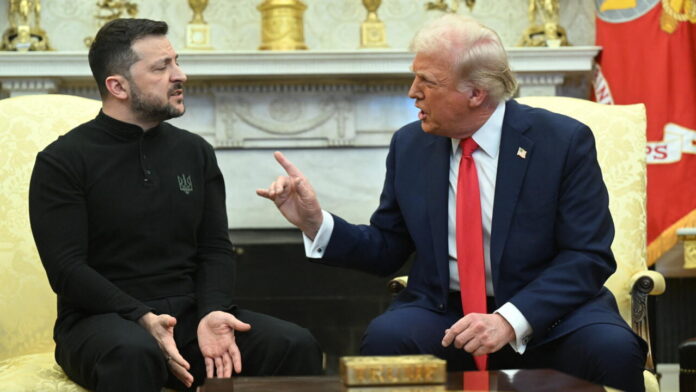The Quiet Surrender in The Hague
On the eve of what could be a defining conversation between Donald Trump and Volodymyr Zelensky at the NATO summit in The Hague, the United States has opted not to escalate sanctions on Russia. The decision, while wrapped in diplomatic language, signals a fracture—both tactical and moral, within the Atlantic Alliance. Far from the headlines and photo ops, this move reveals a complex calculus: when the leader of the Western world hesitates, others must brace for the consequences.
Strategic Pause or Diplomatic Paralysis?
Secretary of State Marco Rubio justified the postponement of sanctions with what has become a familiar refrain: “If we crush them with more sanctions, we probably lose our ability to talk to them about the ceasefire.” The formulation is telling. Behind the scenes, Washington appears more invested in preserving leverage than in punishing aggression.
The final communiqué from NATO describes Russia as a “long-term threat” yet carefully avoids mentioning Vladimir Putin by name. This semantic omission, too deliberate to be accidental, can be interpreted as a gesture of caution, if not appeasement. While Western capitals speak of unity, their language betrays hesitation.
Weak Signals at a Fractured Summit
“Russia could attack a NATO member within the next five years,” Zelensky warned—an appeal that fell flat among allies still haggling over defense budgets.
While Zelensky continues to press for bolder action, including a reduction in the Russian oil price cap from $60 to $45 per barrel, Trump’s team is playing for time. The economic front is being treated not as a battlefield, but as a negotiation table. In Brussels, this is called realism; in Kyiv, it feels like abandonment.
To make matters worse, Dutch authorities reported an act of railway sabotage just hours before the summit opened, yet another “low-intensity” incident that speaks volumes about Europe’s fragile security architecture.
Official Rhetoric vs Geopolitical Realities
The contradiction is stark: while NATO talks of increasing military spending to 5% of GDP by 2035, Zelensky criticizes the pace as “too slow.” In private, some Eastern European leaders fear the American pivot could be more than rhetorical.
Meanwhile, the Trump–Zelensky meeting, set for June 25, is cloaked in diplomatic ambiguity. Trump says he plans to discuss “Zelensky’s difficulties,” a phrase so vague it almost mocks the urgency of Ukraine’s situation. Referring to the Ukrainian president as a “nice guy,” Trump offers charm instead of commitments.
A Meeting or a Moment of Reckoning?
The US refuses Russia sanctions policy on the eve of such a crucial bilateral exchange is not just a diplomatic choice, it’s a geopolitical statement. It signals that Washington, under Trump’s guidance, is increasingly inclined to see Ukraine not as a priority, but as a problem to manage. If sanctions are a tool of moral clarity, then their absence now reflects a shift in posture: from confrontation to cold transaction.
NATO, once a cornerstone of post-war order, now wavers between lofty declarations and strategic restraint. The message is clear to those listening carefully: the old alliances are still speaking, but no longer in one voice.
A Fractured West, A Patient East
The refusal to enact new Russia sanctions, just hours before Trump and Zelensky meet, suggests the West’s bark is louder than its bite. Behind the summit’s fanfare, behind the glossy press conferences, lies a quiet but unmistakable signal: deterrence is negotiable. In this age of great power rivalry, that may prove the most dangerous message of all.



